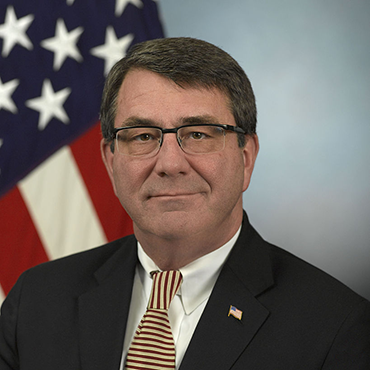Pentagon chief: 2017 budget includes $7B for cyber
Defense Secretary Ash Carter said the money would be used to better train cybersecurity personnel and develop more offensive tools.

Defense Secretary Ash Carter portrayed the Pentagon's cyber budget as a lasting commitment to a highly contested domain.
To better train the Defense Department's cybersecurity personnel and develop more offensive tools, the department's fiscal 2017 budget request includes nearly $7 billion for cyberspace operations, said Defense Secretary Ash Carter.
"Among other things, this will help to further DOD's network defenses, which is critical; build more training ranges for our cyber warriors; and also develop cyber tools and infrastructure needed to provide offensive cyber options," Carter said in a Feb. 2 speech. President Barack Obama will formally submit the budget request next week.
According to the DOD CIO's records, the Pentagon's fiscal 2016 budget request included $5.5 billion for cyberspace operations. It is unclear if Carter was using the same metrics in citing the nearly $7 billion for fiscal 2017. A spokesperson did not respond to requests for clarification.
Carter portrayed the Pentagon's cyber budget -- which he said would total about $35 billion over five years -- as a lasting commitment to a highly contested domain. DOD's broader IT expenditure is several times larger than the amount carved out for cyber operations. For example, the department spent $35.9 billion on IT in fiscal 2015.
Sen. John McCain (R-Ariz.), chairman of the Senate Armed Services Committee, has called on the Obama administration to invest more in offensive cyber capabilities, and there appears to be momentum for doing so. Adm. Michael Rogers, head of U.S. Cyber Command, has talked more openly in recent months about honing his command's offensive tools.
The Pentagon's fiscal 2017 request also includes $71.4 billion for research and development, Carter said, which would mark the second year in a row in which R&D budgets have grown. That amount is "a number that no other institution in the United States or the world comes close to," he said at the Economic Club of Washington.
Carter and his deputies have made an ongoing push to shore up what they see as the United States' eroding technological advantage over adversaries, partly by opening up an outreach office in Silicon Valley to scout emerging technologies.
In response to a question, Carter said the leaks by former National Security Agency contractor Edward Snowden made companies less trusting of DOD, adding, "I've worked very hard to try to overcome" that distrust. He noted that some have used the Snowden leaks as "a guise for protectionism." After the leaks, the Brazilian government, for example, announced it was ditching Microsoft Outlook for an email system based in Brazilian data centers.
'Major inflection point'
"This budget marks a major inflection point [for DOD in that] we're taking the long view" of strategic challenges, said Carter, a technocrat who has served as the undersecretary of Defense for acquisition, technology and logistics.
Confronting challenges posed by U.S. competitors such as China and Russia will be particularly crucial in cyberspace, electronic warfare and space, "where our reliance on technology has given us great strengths but also led to vulnerabilities that adversaries are eager to exploit," he said.
He also described important ongoing projects at the Strategic Capabilities Office he created in 2012, when he was deputy secretary. One project uses swarming drones, including micro-drones that can be dispatched from a high-velocity jet.
Carter's advisers have undertaken an extensive review of the Goldwater-Nichols Act, the 1986 law that governs the military's chain of command. He said he expects to receive recommendations in the coming weeks on how the law might be updated. McCain and other lawmakers are conducting their own review of the act.





